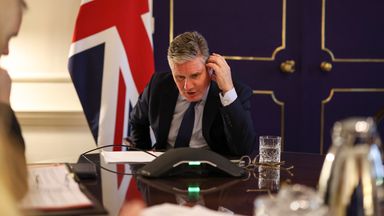Iran’s president tells Sir Keir Starmer retaliation against Israel ‘is a right’ during rare phone call
The prime minister tells President Masoud Pezeshkian he is “deeply concerned” amid growing fears Iran will retaliate against Israel over the killing of Hamas leader Ismail Haniyeh.

Iran’s president has told Sir Keir Starmer retaliation against Israel “is a right” during a rare phone call as part of international efforts to de-escalate tensions in the Middle East.
President Masoud Pezeshkian told the prime minister a punitive response to “an aggressor is a right of nations and a solution for stopping crimes and aggression”, Iran’s official IRNA news agency reported.
Mr Pezeshkian, who became president at the end of July, said the West’s silence about “unprecedented inhumane crime” in Gaza and Israeli attacks elsewhere in the Middle East was “irresponsible” and encouraged Israel to put regional and global security at risk, the report added.
The 30-minute phone conversation between the two leaders on Monday evening followed a joint statement issued by the UK, US, France, and Germany, which called on Iran and its allies to “stand down its ongoing threats of a military attack against Israel”.
There are growing fears Iran will retaliate against Israel over the killing of Hamas leader Ismail Haniyeh in the country, prompting the US to order the deployment of a guided missile submarine to the Middle East.
During his call with Mr Pezeshkian, Sir Keir said he was “deeply concerned by the situation” and called on all parties to “de-escalate and avoid further regional confrontation”, according to a readout of the conversation from Downing Street.
The prime minister also said there was a “serious risk of miscalculation and now was the time for calm and careful consideration”, calling on Iran to “refrain from attacking Israel” and saying that “war was not in anyone’s interests”.
The readout continued: “The prime minister underlined his commitment to an immediate ceasefire, the release of all hostages and increasing humanitarian aid to Gaza.
“He added the focus should be on diplomatic negotiations, to achieve those outcomes.”
Sir Keir also raised the cases of foreign detainees in Iran, and the two leaders agreed that “constructive dialogue…was in both countries’ interests”.
“The prime minister added that could only be furthered if Iran ceased its destabilising actions including threats against individuals in the UK and did not further aid Russia’s invasion of Ukraine”, Downing Street said.
Call ‘very rare occurrence’
Sky’s Middle East correspondent Alistair Bunkall said it was a “very rare occurrence” for a British prime minister to speak to an Iranian leader and it “shows the value” of having a British embassy in Tehran – not something many countries, including the US, have.
In the call, Sir Keir was able to push the message Western leaders are using “as the carrot… to bring Iran down from the edge”, Bunkall said.
That is to say “look, if we can try and push forward with a ceasefire deal and ceasefire talks are due to take place on Thursday, then anything that you do in between that, or even after that, runs the risk of collapsing those talks”, he added.
In the earlier joint statement, which also included Italy, the world leaders said there was “no further time to lose” in reaching a ceasefire and securing the release of the remaining hostages in Gaza.
Read more:
Hezbollah and Iran ‘poised to attack Israel this week’
Calls for revenge after Hezbollah military leader strike
Israel addresses strike on Gaza school-turned-shelter
The statement added: “We expressed our support for the defence of Israel against Iranian aggression and against attacks by Iran-backed terrorist groups.
“We called on Iran to stand down its ongoing threats of a military attack against Israel and discussed the serious consequences for regional security should such an attack take place.”
Iran’s Revolutionary Guards began military drills on Friday in the western province of Kermanshah close to the border with Iraq.
Iran said Hamas’s top political leader Ismail Haniyeh was “assassinated” in its capital Tehran on 31 July.
Israel has not claimed or denied responsibility for Mr Haniyeh’s death.
👉 Click to subscribe to the Sky News Daily wherever you get your podcasts 👈
Asked about a possible retaliation by Iran or Hezbollah, or an escalation in the regional conflict, an Israeli government spokesman described a “ring of terror armies”.
David Mencer told Sky News: “This Iranian axis of evil has formed a stranglehold against Israel.”
He added: “Hezbollah in Lebanon, Hamas in Gaza, the Houthis in Yemen… Israel is going to exact a heavy price for any aggression against us from any arena.
“We’ve made clear, we’ll always put our first hand out to peace to any partner, we want peace within Iran’s people, but this regime, this fascist, Islamist regime which is in control in Tehran, they need to understand that our long arm will reach anyone who causes our people harm.”



